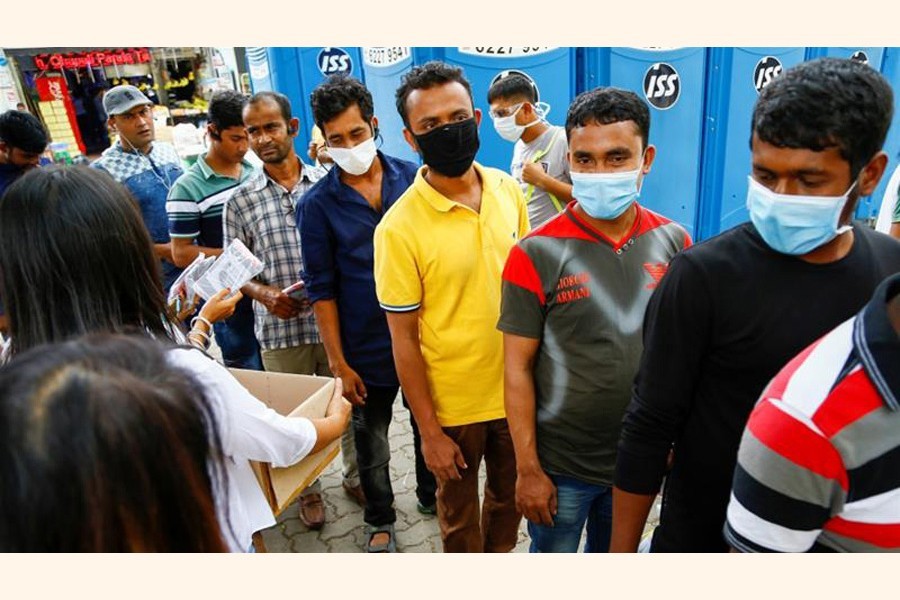
Published :
Updated :

A total of 408,408 Bangladeshi migrant labourers, from April 1, 2020 to December 31, 2020, were sent back to Bangladesh amid the Coronavirus pandemic, says a report by International Organisation for Migrants (IOM).
This could be menacing for the employment sector, particularly, since low-skilled returnees are either spiritually or physically impaired due to their susceptibility to exploitation.
In response to the ongoing crisis, Bangladesh’s government has set up an $85 million fund to support repatriated migrants, which will provide them with a soft loan without the requirement for collateral (Migration Information Source, 2020).
The fund’s purpose is to train migrants so that they can find better jobs abroad once the situation stabilises, as well as to provide them with seed money to be able to start employment-generating activities.
These Bangladeshi domestic workers leave the country in the hope of higher-income opportunities and better living standards in the destination country. Others are forced to migrate due to family pressure, or those who migrate to support their subsistence because of the scarcity of income-generating opportunities within the country.
Left with no explanation for their departure, most of them still chose to stay unemployed in the hope of returning to their destination countries.
Therefore, to be able to assist them in engaging in economic activities, the government of Bangladesh has allocated funds within its capacity for the reintegration of returnees through efficient training.
Furthermore, to support the government's policies, NGOs and multilateral organisations, for instance, the International Organisation for Migration (IOM), have begun to collaborate on measures to avert migrant labourers from floundering, and these efforts are likely to continue.
Financial institutions including the World Bank, the International Monetary Fund, the Asian Development Bank, and the Islamic Development Bank might help fund the initiative.
Migrant vulnerability is caused by various factors, though one of the major factors contributing to it is unlicensed recruiting agencies. Due to asymmetric information on migration, the low-skilled workers are usually manipulated by the middlemen, or ‘dalals.’
These middlemen spread false information about the migrants’ job availability and potential income. The fiscal process includes arrangements for their passport, visa, and broker’s charge, but the middlemen provide these services without any provision for legal document certification.
Mutasim Billah Mubde, the principal researcher in the project titled ‘Hidden Costs of Migration: Evaluating the Bangladesh Malaysia Corridor’ funded by USAID and implemented by Winrock International, further elaborated the condition of illegal dalals by stating that the recruiting agencies depend on the dalals to get through the candidates in the areas outside Dhaka where they are not legally located.
As a result, he explained, "The recruiting agencies do not want the dalals to be found because they are assisting them in finding potential migrants. The exorbitant fees are correspondingly shared between the middlemen and agencies. Hence, it hampers their probable profit as well.”
To avert this, the government or BMET can recruit the returned migrants as the new middlemen under a licensed middlemen programme in their respective districts, and they will not be a part of the recruiting agencies, suggested Mr Mutasim.
“The returnees will have worked for twenty or thirty years abroad and do not count among the working population anymore. Therefore, these regulated middlemen will have special IDs to be verified by the migrants."
Under these conditions, if they can lower the extravagant migration cost, then the dalals will either join the regulated middlemen programme or they will eventually move out of the migrant business.
To implement this policy, the establishment has to be done under BMET or the government as this plan requires bypassing the recruiting agencies.
There has to be an anonymous system where the recruiting agencies cannot track the licensed middlemen for coercing them to be unlicensed dalals. It is going to take some time, but as an initial step, this will help to regulate the illegal middlemen in the process and they will be taken over by the regulated middlemen.
The government has highlighted and advocated adopting actions for particular expansion measures of the District Employment and Manpower Office at the grassroots level by affiliating with local bodies as part of the ‘Seventh five-year National Plan for Bangladesh’ (2016-2020).
The proposal also included launching widespread campaigns with a purposeful information kit explaining in plain language the costs and benefits of jobs abroad, migrant rights and responsibilities, placement options abroad and public and private support systems available to them to reduce migration risks.
This will equip the potential migrants to make valuable decision with adequate information about the costs and benefits in the host countries.
sadiakarim98@gmail.com


 For all latest news, follow The Financial Express Google News channel.
For all latest news, follow The Financial Express Google News channel.